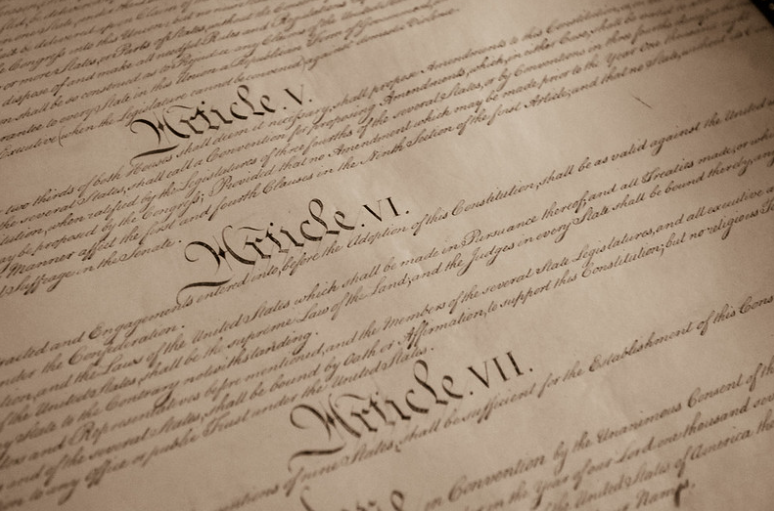Our last column focused on the Supremacy Clause of the Constitution, Article VI Sec. 2 which states,
“This Constitution, and the Laws of the United States which shall be made in Pursuance thereof; and all Treaties made, or which shall be made, under the Authority of the United States, shall be the supreme Law of the Land; and the Judges in every State shall be bound thereby, any thing in the Constitution or Laws of any State to the Contrary notwithstanding.”
Observe the order of priority: The Constitution is the supreme law of the land. That means the entire Constitution, including the 10th Amendment, which provides that “The powers not delegated to the United States [federal government] by this Constitution, nor prohibited by it to the States, are reserved to the States respectively, or to the people.”
So whatever powers the Constitution delegates to the federal government are the supreme law of the land, and whatever powers the Constitution reserves to the states are also the supreme law of the land.
Second in order of supremacy are "Laws of the United States which shall be made in Pursuance thereof." Laws adopted by Congress are the supreme law of the land only if they are made pursuant to the Constitution. That is, they must be enacted by the legislative body (Congress) that the Constitution has established, and they must be within the powers the Constitution delegates to Congress, most of which are in Article I, Section 8.
Third, Article VI Sec. 2 mentions "all Treaties made, or which shall be made, under the Authority of the United States." Unlike laws which are made under the authority of the Constitution, treaties are made under the authority of the United States.
Does this mean treaties are exempt from the restrictions of the Constitution? Does it mean treaties are supreme even over the Constitution? Some, especially professors of international law, answer yes to that question because a treaty is a contract between nations that takes precedence over any internal document within the nation. Partly for this reason, presidents from both parties have sometimes acted in foreign affairs pursuant to resolutions adopted by the United Nations, which the U.S. entered by treaty, rather than pursuant to a Congressional declaration of war. Many are concerned that international treaties could be the vehicle to bring the U.S. under global government, ending our sovereignty as an independent nation.
At least one Supreme Court decision stands in the globalists' way. Reid v. Covert (1957), involved a status of forces agreement (SOFA) between the U.S. and the United Kingdom which provided that whenever a U.S. serviceperson or dependent was suspected of a crime, U.S. military courts rather the English courts would have jurisdiction over the offense.
Clarice Covert was charged with murdering her husband, Sgt. Covert, while he was stationed in England. As the U.S. Air Force prepared to court-martial her pursuant to the SOFA, she argued that under the U.S. Constitution, military court-martial jurisdiction extended only to military members; as a civilian, the Fifth and Sixth Amendments entitled her to trial before a civilian court established under Article III.
Reversing a ruling on this case the year before, the Supreme Court held that the SOFA could not limit Covert's right to trial by jury under the U.S. Constitution. Citing the Supremacy Clause, the Court declared,
"There is nothing in this language which intimates that treaties and laws enacted pursuant to them do not have to comply with the provisions of the Constitution. Nor is there anything in the debates which accompanied the drafting and ratification of the Constitution which even suggests such a result."
The Court further said the federal government cannot "exercise power under an international agreement without observing constitutional prohibitions. In effect, such construction would permit amendment of that document in a manner not sanctioned by Article V."
In other words, neither Congress nor the president nor both acting together can in effect amend the Constitution by adopting an international treaty or executive agreement. For example, if President Biden is upset over the way Americans exercise their right to worship the Triune God but is unable to amend the Constitution to repeal the First Amendment, he cannot curtail the free exercise of religion with a stroke of the pen by simply entering into an executive agreement with Iran that forbids worship of the Trinity. The Constitution may be amended by a two-thirds vote of both Houses of Congress (or by a convention) followed by ratification by three-fourths of the states. It cannot be amended by treaty.
Why, then, does the Supremacy Clause speak of treaties made under U.S. authority rather than pursuant to the Constitution? Probably, as the Court suggested, "so that agreements made by the United States under the Articles of Confederation, including the important peace treaties which concluded the Revolutionary War, would remain in effect."
Some globalists still insist that treaties supersede the Constitution, but Reid v. Covert clearly says otherwise.
So the Supremacy Clause says the Constitution, laws, and treaties shall be the supreme law of the land. But what about court decisions? That will be the subject of a forthcoming column.
Colonel Eidsmoe is Professor of Constitutional Law for the Oak Brook College of Law and Government Policy (www.obcl.edu) and Senior Counsel for the Foundation for Moral Law (www.morallaw.org). He may be reached for speaking engagements at eidsmoeja@juno.com. Those with constitutional concerns may contact the Foundation at 334/262-1245.
The views and opinions expressed here are those of the author and do not necessarily reflect the policy or position of 1819 News. To comment, please send an email with your name and contact information to Commentary@1819news.com.
Don’t miss out! Subscribe to our newsletter and get our top stories every weekday morning.










